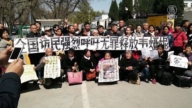【新唐人2013年07月13日訊】最近大陸媒體,長篇報導中國精神病患者的人數和處境,相對的「被精神病」事件也頻頻被曝光。一直以來,精神病院可以說是中共公安部門的一個分支機構,許多維權人士、上訪人士被以精神病的名義,關押在精神病院遭受折磨與迫害,時有所聞。那麼,媒體所報導的中國精神病人超過1億人,這個數字背後又是代表甚麼意思呢?
住在哈爾濱的趙桂榮,她的丈夫邢世庫,因為向國家信訪局反映他在國有企業改制前後,自身應得的職工待遇被廠長王凱民侵佔等問題,而被當局強行綁架關進哈爾濱市第一專科精神病醫院,後來又轉移到道外區精神病院關押,到現在已經第七年了。這是個典型的、發生在現今中國大陸的被精神病事例。
大陸黑龍江省居民趙桂榮:「信訪部的官員他就是叫我們拿錢去贖人,因為當時我們把房子押了,贖都沒贖出來,因為他們是流動的,好多都像我愛人一樣訪民好多人和我一樣,中國不是我自己,比我慘的和一樣慘的有的是。」
趙桂榮的朋友馬波,也陪著她一起去精神病院探訪她丈夫,馬波說,一個正常人被關進精神病院,遲早會出事。
大陸黑龍江省居民馬波:「他(邢世庫)是在北京上訪期間給抓過去的,很正常的(人),他跑了好幾次都給被抓回來了,承包的醫院的院長說他也沒有甚麼專科文品,專門治療精神病這塊的他也沒有,他也說得很明確、誰送來、誰拿錢、誰說話。」
反腐維權聯盟成員劉純寶、馬波、小胖,兩次陪同趙桂榮到精神病院要人,但醫院的院長說,誰拿錢送進來的誰說了算。
中國沒有專門的精神健康法律,造成了中國的精神病人被亂收治的局面,醫生僭越法官的權力,醫院無須事先見過當事人,無須事先進行醫學診斷,收治時無須聽取本人的意見。僅憑送治人單方面提供的描述,醫院就可以把人強行收治起來。這種收治方式與被收押沒有甚麼不同。
於是,當局將上訪者投入精神病院﹗那麼在這種環境下,有可能每一個人都會變成精神病人。
日前官方的資料顯示,中國各類精神疾病患者有1億人以上,其中重症精神病患者超過1600萬。在這龐大的精神病患背後,有多少訪民是被精神病呢﹖
7月5號,廣西籐縣第三人民醫院有42名精神病人集體逃脫。據報導,這些所謂的病人挾持醫院的巡查護理員,並搶走護理員的鎖匙、手機及現金、然後打開病區的大門逃出。
雖然這42名精神病人逃走後又被全部追回,但是「病人為何能強行出走?」、「醫院是如何管理的?」、「是否有人被精神病?」民眾急於了解這些疑點。
大陸《財經網》的副主編羅昌平就在微博提出質疑,他問,一群重症瘋子何以策劃逃跑?他們如何說服超過八成的瘋子,並繞過正常的醫護人員?其中有無被精神病?這裏隱藏了多少悲劇與罪惡?
有網友說,這說明司法如不獨立,就算取消勞教照樣有辦法送你進精神病院被精神病。
大陸權利運動組織發起人胡軍:「精神病這一塊,一直是中共打壓異議人士,打壓這個訪民和法輪功群體成員,但這一直都沒有被大家關注,但是現在這件事情肯定要突出了,有更多的訪民被抓了被失蹤了,是不是都關精神病院,但是勞教所這塊撤了的話,但撤了那人員應該怎麼處理?」
對於最近北京一家較大規模的勞教所正在低調釋放被勞教人員,大陸權利運動組織發起人胡軍表示,是不是當局把勞教制度廢了,把這些人又重新關進精神病院,通過另外一種換湯不換藥的手法,來對中國的百姓進行迫害呢﹖這是大家值得關注的問題。
採訪/陳漢 編輯/黃億美 後製/郭敬
Where are China’s Over 100 Million Mental Patients from?
Mainland Chinese media recently published a lengthy report
on the number of China’s mental patients and their situation.
Meanwhile, cases of mentally fit people being forcibly
placed in mental facilities have been often revealed.
Mental facility has always been a branch organization of
the Chinese Communist party’s Public Security Bureau.
Many rights activists and petitioners are placed
in mental facilities, and face torture and persecution.
Then, one may wonder: What’s the story behind the
100 million mental patients in China reported by the media?
Zhao Guirong from Harbin told NTD that her husband
Xing Shiku went to the National Petition Office to report on
his factory director for taking his work benefits.
He was then taken and forcibly placed in Harbin First Hospital’s
Mental Department after he reported the issues.
Xing was later transferred to Daowai District Mental Hospital,
and he’s been there for 7 years.
That is a typical case in modern China that
a person with a healthy mental condition
is forcibly placed into mental institutions.
Zhao Guirong, resident of Heilongjiang province:
“An official at the petition office asked us to post bail for [my husband].
We mortgaged our house, but still couldn’t get him out.
There are so many petitioners like my husband.
Many of them are like myself,
and many are even more miserable than me.”
Zhao Guirong’s friend Ma Bo accompanied Zhao
to visit her husband in the mental hospital once.
Ma Bo says that a normal person would have a problem
sooner or later while being detained there in the hospital.
Ma Bo, resident in Helongjiang province:
“He (Xing Shiku) was arrested in Beijing while petitioning.
He’s a very normal person.
He tried to escape many times, but was caught every time.
The hospital said that they didn’t have a mental department.
Whoever is sent to there must pay to negotiate.”
Anti-corruption and Activists Alliance members Liu Chunbao,
Ma Bo, and Xiao Pang accompanied Zhao Guirong twice
to the mental hospital to ask for her husband Xing’s release.
But the hospital director said that
he would listen to whoever brings money.
China doesn’t have specific mental health laws, which leads
to people being arbitrarily treated as mental patients.
Doctors and hospitals don’t need to ask for patients’ opinion,
nor do they need to have medical diagnosis before treatment.
Simply according to the description of whoever sends
the patient, the hospital will receive the patient, it would be the same as detaining someone.
Thus, local authorities place petitioners in mental hospitals.
In that environment, anyone could be labeled mentally ill.
Current official data says that there are over 100 million
people with various types of mental illnesses in China,
among them, over 1.6 million have severe mental illness.
How many petitioners among those mental patients
are “forced to be mentally ill”?
A group of 42 mental patients together escaped
the Third Hospital of Tengxian in Guangxi province on July 5.
According to the report, those so-called mental patients
captured care workers and snatched keys, cell phones,
and cash and then escaped.
Although the 42 mental patients were all caught again later,
people are eager to know: “Why did the patients run away?”,
“How does the hospital manage the mental patients?”,
and “Was anyone labeled mentally ill, and forcibly put there?”
Luo Changping, associate editor of financial website Caijing.com,
questions: “How could a group of lunatics plan an escape?”
“How could they convince so many other patients to join in,
and then, even get past the care workers?”
“Are there normal people being forcibly detained?”
“How many tragedies and crimes are being hidden here?”
A netizen says that as long as the judiciary isn’t independent,
even if the labor camp system is abolished, you can still be
labeled mentally ill, and placed in a mental hospital.
Hu Jun, founder of Human Rights Campaign in China:
“China’s mental hospitals have always been used for
suppressing dissidents, petitioners,
and Falun Gong practitioners.
But it hasn’t been paid attention to.
But now this thing must be highlighted.
More and more petitioners are arrested and end up missing.
Were they placed in mental hospitals?
If labor camps are abolished, what do they do to those people?”
Regarding a large labor camp in Beijing releasing inmates
in a low-key way, Hu Jun says that
whether the authorities abolish the labor reeducation
system, or just move those detained into mental hospitals.
Regardless of what method is used, aren’t they all superficial
changes to methods used to persecute the Chinese people?
This is a matter of great concern.

























